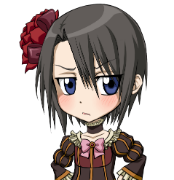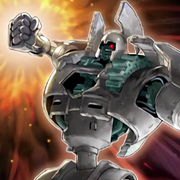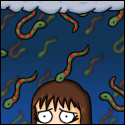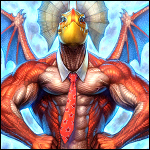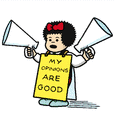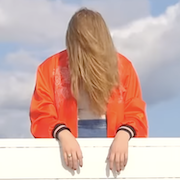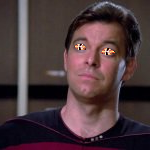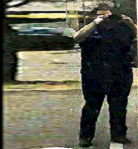|
Ultimately I think the whole story would have been better if Venat had also been caught in the Kairos memory alteration and only the WoL and Argos escaped. They try to handwave away why Venat couldn't just tell people what she knew but as musouka points out up above that doesn't really work, and it's even possible to interpret it that Venat sundered the world because if she didn't the time loop would break, which is... unsatisfying. That's not the intended read at all for why she sundered the world, but I wouldn't blame someone for drawing that conclusion either  If Venat had also forgotten, the shape of thestory from there wouldn't have to change. The WoL and Scions could still go meet Hydaelyn, then WoL tells her what happened in the past and she reaches out and finds the beacon she placed and then the "test of resolve" proceeds and everything goes on from there. musouka posted:The thing that really sticks in my craw about Venat's plan, even now is that she had full information including where the source of the Sound was coming from and proof in the form of a brand affixed to Meteion. The Ancients were trying to stabilize a situation where their planet was dying, but at no point is it implied that she tried to explain that she knew exactly what was causing the problem. After things were stabilized, it's possible that the Ancients would have turned to trying to solve the issue, but we'll never know because Venat trusted knowledge of the future instead of an unknown variable like the actions of her people after they were traumatized. I guess the other possible alternative is that Venat knew that people would need to be able to harness dynamis to win, hence needing to sunder the world even if she did tell people about Meteion after everything settled, though we're also shown that the Ancients can create beings who can harness dynamis, so... 
Harrow fucked around with this message at 17:47 on Dec 8, 2021 |
|
|
|

|
| # ? Jun 11, 2024 20:28 |
|
Harrow posted:Ultimately I think the whole story would have been better if Venat had also been caught in the Kairos memory alteration and only the WoL and Argos escaped. They try to handwave away why Venat couldn't just tell people what she knew but as musouka points out up above that doesn't really work, and it's even possible to interpret it that Venat sundered the world because if she didn't the time loop would break, which is... unsatisfying. There is absolutely strong implication that closing the time loop was a significant motivator for Venat, since Venat herself mentions multiple times about converging the timelines, and Emet also mentions Venat was counting on him to tie together the remaining threads of history, and then throws a mini-tantrum about her letting him go through everything he had for that.
|
|
|
|
Harrow posted:Ah, thanks for quoting it. That does make sense. Here's my take on that scene this is the setup for the second sacrifice, Hythlodaeus was not part of the first sacrifice but was part of the second (which fits, he'd absolutely give his life to repopulate the Star secure in the knowledge that Zodiark already stopped the calamity and Emet-Selch and the Convocation are there to guide what is reborn). Hence the people begging Lord Zodiark for a return to the world they had, that's what the second sacrifice was meant to do after all, undo the damage the End of Days had caused to the star, the first stopping the End of Days themselves. However, Venat sees this and resolves to oppose the Convocation, she doesn't sunder the realm then and there but she takes a stand and from there does the stuff we see later. Or she sunders the world right after the second sacrifice. It's pretty clear though that scene is meant to be us viewing her memories as we return to the present, not necessarily an actual vision of what happened. But yeah, imagine Hythlodaeus is walking off to sacrifice himself to Zodiark as part of the second set, and Venat during that period decides to collect likeminded fellows to stop any third sacrifice.
|
|
|
|
Lord_Magmar posted:Here's my take on that scene this is the setup for the second sacrifice, Hythlodaeus was not part of the first sacrifice but was part of the second (which fits, he'd absolutely give his life to repopulate the Star secure in the knowledge that Zodiark already stopped the calamity and Emet-Selch and the Convocation are there to guide what is reborn). Hence the people begging Lord Zodiark for a return to the world they had, that's what the second sacrifice was meant to do after all, undo the damage the End of Days had caused to the star, the first stopping the End of Days themselves. Yeah, I agree that's the only real way it all makes sense.
|
|
|
|
Honestly, I really don't think they knew what they were doing with the time travel plot at all. After you come back to the present, there are multiple NPC dialogues where characters say things along the lines of, "you might've created an alternate timeline! you shouldn't assume what you just did fed into the present!", and the whole scene where Venat transforms into Hydaelyn feels like it was written with the intent of it being ambiguous if that happened or not - she displays no foreknowledge there, after all, and in fact follows the script of what we'd told her was going to happen to an almost silly-feeling degree. But then afterwards, its ends up being this awkward stable time loop that doesn't really make any sense if you think about it for more than a minute. And then at the very end it feels like they're back to flirting with a timeline split again? It feels like there was a rewrite that happened at some point in Endwalker's development, and they tried to patch it up, but couldn't quite make it work properly.
|
|
|
|
PoorWeather posted:Honestly, I really don't think they knew what they were doing with the time travel plot at all. After you come back to the present, there are multiple NPC dialogues where characters say things along the lines of, "you might've created an alternate timeline! you shouldn't assume what you just did fed into the present!", and the whole scene where Venat transforms into Hydaelyn feels like it was written with the intent of it being ambiguous if that happened or not - she displays no foreknowledge there, after all, and in fact follows the script of what we'd told her was going to happen to an almost silly-feeling degree. But then afterwards, its ends up being this awkward stable time loop that doesn't really make any sense if you think about it for more than a minute. And then at the very end it feels like they're back to flirting with a timeline split again? Nah I think it makes sense early on Hydaelyn mentions a confluence of her time and ours, she's not sure if it's going to happen or not. So the basic idea is that Hydaelyn has memories of two timelines, the original one, and the one where we went back, but they're ultimately the same timeline. We don't change enough to actually affect the Timeline, either because Venat ultimately realises that the timeline we laid out is the one she'll work towards (which the end of the zone where she does in fact agree that she'll have to work separate from the convocation specifically to avoid Hermes finding poo poo out), or because not enough effect occurred even with Venat not following the original path. Anyway she totally remembers the past, even in the first time we meet her, she even sends Argos to us knowing Argos likes us. Elidibus' whole commentary is specifically that if we create a split timeline we can't go home, same as G'raha no longer being able to go back to the alternate timeline where we died and the Black Rose was used (even though it does in fact still exist). Our mission requires us not to split the timeline, because if we do we no longer can return to the place we're needed to save the world. But we'd still have left the timeline we're from existing, it just wouldn't have us in it anymore.
|
|
|
|
Lord_Magmar posted:Nah I think it makes sense early on Hydaelyn mentions a confluence of her time and ours, she's not sure if it's going to happen or not. So the basic idea is that Hydaelyn has memories of two timelines, the original one, and the one where we went back, but they're ultimately the same timeline. We don't change enough to actually affect the Timeline, either because Venat ultimately realises that the timeline we laid out is the one she'll work towards (which the end of the zone where she does in fact agree that she'll have to work separate from the convocation specifically to avoid Hermes finding poo poo out), or because not enough effect occurred even with Venat not following the original path. Anyway she totally remembers the past, even in the first time we meet her, she even sends Argos to us knowing Argos likes us. I dunno, maybe it's something that will come together in the post-expansion content, but right there are too many loose threads and janky plot elements for it to feel like they entirely had a handle of it. Like, Elidibus seems to suggest the WoL going back in time at all because he remembers them being in Elpis, but then you never even meet. And again, after you leave, some of G'raha's optional dialogue compares your situations and fields the idea of an alternate timeline, IIRC. Why bother putting that in at all if you're not gonna do anything with it?
|
|
|
|
Thinking about it more, I suppose things really did have to happen the way they did for all of this to succeed. Sure, the Ancients could demonstrably create beings capable of using dynamis to fight back against Meteion, but could they do it just right? If they made beings too weak in dynamis they'd be just like them; too strong and they'd be as empathic as Meteion and fall victim to the same overwhelming despair. And even if they did get the balance just right, as we see in the story, they needed more than that. They needed people to come together and form unbreakable bonds and believe in each other in the face of any adversity or they wouldn't have even been able to physically reach Meteion in the first place (due to not being able to even perceive her realm made entirely of dynamis until a sacrifice and heartfelt, emotion-fueled wish made that possible). Given that I suppose it makes sense that the only real way to make that happen is to create a world where it could, and then hope. PoorWeather posted:I dunno, maybe it's something that will come together in the post-expansion content, but right there are too many loose threads and janky plot elements for it to feel like they entirely had a handle of it. Like, Elidibus seems to suggest the WoL going back in time at all because he remembers them being in Elpis, but then you never even meet. And again, after you leave, some of G'raha's optional dialogue compares your situations and fields the idea of an alternate timeline, IIRC. Why bother putting that in at all if you're not gonna do anything with it? Regarding Elidibus, my guess is that particular question will be answered in the Pandaemonium raid content, considering that's definitely him monologuing in the post-credits scene.
|
|
|
|
I think a lot of the confusion and perceived narrative dissonance over the last few pages comes from the fact that EW has two interrelated but distinct themes, and one of them is directly applicable to our actions in the real world, while the other is philosophical and highly theoretical. The first is that, suffering is our constant companion in the journey of life, but that doesn't mean you give up and stop struggling for the moments of joy in between. This message is pretty directly applicable to the real world. The second is that any society sufficiently advanced to truly attempt to challenge the first truth is doomed to failure. As I read it, this isn't intended as metaphor but as philosophy. It's not a direct condemnation of any specific real-world action because humans do not have even close to enough control over our own lives to fit the criteria. It's philosophical and intended to trigger contemplation, not allegory with an intent to trigger a change in perception of the world as it exists today. At least that's how I read it. Venat doesn't need any future knowledge to draw the second conclusion: it falls out of Meteion's report. So it's less that suffering is good, actually, and more that suffering is unavoidable, and the people best able to cope with a universe with this inescapable fact are the ones who can't, with a wave of their hands, pretend otherwise by using magic to paper over the most obvious examples.
|
|
|
|
Harrow posted:Regarding Elidibus, my guess is that particular question will be answered in the Pandaemonium raid content, considering that's definitely him monologuing in the post-credits scene. It is. Emet-Selch mentions that besides retired members of the Convocation like Venat, only Elidibus wears white robes. So yeah, it is clearly him. That means we did meet Elidibus in Elpis (in his past, our near future) but it was after we stopped the Final Days, which is wild. I really wonder how that's going to feature in the raid storyline. Maybe the WoL just refuses to tell him anything about the future out of fear of a time paradox?
|
|
|
|
PoorWeather posted:I dunno, maybe it's something that will come together in the post-expansion content, but right there are too many loose threads and janky plot elements for it to feel like they entirely had a handle of it. Like, Elidibus seems to suggest the WoL going back in time at all because he remembers them being in Elpis, but then you never even meet. And again, after you leave, some of G'raha's optional dialogue compares your situations and fields the idea of an alternate timeline, IIRC. Why bother putting that in at all if you're not gonna do anything with it? It's also possible we met Elidibus and didn't notice. After all Hades and Hythlodaeus are there to check on the potential replacement for Fandaniel, and we don't actually know what the time period between when we arrive in Elpis and when the End of Days actually started. Especially given Metion specifically mentions having to hoard pain and suffering to get enough Dynamis power to actually even touch the incredibly aether dense planet in the first place. Ojetor posted:It is. Emet-Selch mentions that besides retired members of the Convocation like Venat, only Elidibus wears white robes. So yeah, it is clearly him. That means we did meet Elidibus in Elpis (in his past, our near future) but it was after we stopped the Final Days, which is wild. I really wonder how that's going to feature in the raid storyline. Maybe the WoL just refuses to tell him anything about the future out of fear of a time paradox? I thought that it also might be a previous Lahabrea and the idea that we'd be interacting with the one we know was a trick.
|
|
|
|
 So what's the triangle spaceship in the logo? I assumed it would be the ship you go to the moon on, but that obviously worked out way different. Maybe it was designed based on an early draft of the story? Or a deliberate red herring?
|
|
|
|
Lord_Magmar posted:I thought that it also might be a previous Lahabrea and the idea that we'd be interacting with the one we know was a trick. If nothing else it was for sure Elidibus’s voice.
|
|
|
|
Fister Roboto posted:
I think you may be in the wrong thread for this question but the spaceship comes up later.
|
|
|
|
Fister Roboto posted:
Maybe this is too much of a stretch, but it reminds me of alphinaud/alisae's rainbow stairs going up to the dead planet in the last zone. I feel like some kind of funky stuff must have happened behind the scenes with the design of the ragnarok for sure
|
|
|
|
Looks like a very stylised Ragnarok to me.
|
|
|
|
Personally my take on the Zone 5 stuff was after the second Zodiark sacrifice, Venat saying “I sunder you” and stuff wasn’t actually the Hydaelyn summoning, but more of a declaration of her philosophy and she either killed or forcibly subdued those Ancients. Hydaelyn herself probably wouldn’t hurt ancients, but I can see Venat the person forcing herself to do it under the circumstances. And then a short time later, she gets a few followers to summon Hydaelyn and she serves as the heart. At least that way I can see Emet and Lahabrea being as miffed about Hydaelyn as they are if some ancient told them a second-hand account about how Venat went unhinged, talking about sundering all of us, and is going to oppose Zodiark. If the EW scene happened literal, when did Emet/etc even find out Venat did this? And although Venat had some knowledge, I think she was more interested in closing the loop and there was no guarantee the ancients wouldn’t make things worse (like if Hermes still managed to pull another Ted Faro even after he erased his own memories) MechaX fucked around with this message at 18:49 on Dec 8, 2021 |
|
|
|
Fister Roboto posted:
Level 89 it's the Ragnarok, either an early design version that got submitted to the artist or a deliberate misdirect so you don't see the ship's actual design before the story introduces it.
|
|
|
|
I will say thjat it's a spectacular misfire of chekhov's gun that the moon is a spaceship and it never goes anywhere.
|
|
|
|
cheetah7071 posted:I will say thjat it's a spectacular misfire of chekhov's gun that the moon is a spaceship and it never goes anywhere. Yet.
|
|
|
|
Maybe it just didn't translate well to 3D, but a cool texture pillar thing would probably have been way more memorable for the ragnarok than the honestly pretty generic design they went with IMO. Considering ultra amano style hydaelyn looked loving awesome in game, feels like a shameful lack of trust in the GOAT
|
|
|
|
With regards to the ending. It reminds me a lot of the discussion around The Good Place and how people were upset and offended at it. The themes of EW are not that suffering is good or makes you stronger. It is that suffering exists. That is an undeniable part of life. Trying to make your goal the end of fear and suffering at all costs sounds noble on the surface but only if you ignore that it is an impossible task. The Ancients are a great example of this case. They live in a blissful immortal society where they have godlike powers. However this society depends on a uniformity of thought and action and a sanding down of any rough parts. Your creations have to be approved by others. You're not allowed to wear different outfits without being considered offensive. Creatures can exist but only as long as they are not dangerous or disabled or anything that might interrupt peace. Everything in their society is dedicated to a positive purpose which is probably why they are healthier than some of the other societies, but it also is one where every rough edge is rounded down and where someone like the Azems or Hermes are considered weird or strange. And this sounds like a lovely place to live despite that and most of us would probably be happy for our simple mortal lifespans there. Yet at the same time it's temporary. Eventually something will happen. Hermes is an example (and an epic-level fuckup) but it very well could have been something else, or the super-robots who made Omega might have eventually made their way there, or an accidental plague, or whatever. Once a horrific thing happened they were prepared to do anything to return to stability, even if it meant mass murder of 'lesser' beings. Their happiness was built on fragile blocks and once those blocks came tumbling down you saw that their desperation was to return to the happiness at all cost. EW has the very relevant message that you can't escape being sad or unhappy or unlucky or confused or feeling out of place. That however doesn't mean life is worthless. Nor does it make happiness an unwelcome goal. The only way happiness is bad is if you are incapable of dealing with it going away or are willing to inflict suffering on others to keep your own. Suffering exists and if you continue to strive then you will get hurt and fall and have to get back up. Even in a perfect transhumanist society you can't escape it because that isn't how the universe works. Even if you're immortal and flawless someday the universe will end. There will be sadness in your future. What makes life worth living is accepting that and continuing to try to better yourself despite it.
|
|
|
|
Harrow posted:Ultimately I think the whole story would have been better if Venat had also been caught in the Kairos memory alteration and only the WoL and Argos escaped. They try to handwave away why Venat couldn't just tell people what she knew but as musouka points out up above that doesn't really work, and it's even possible to interpret it that Venat sundered the world because if she didn't the time loop would break, which is... unsatisfying. Doing it that way would also resolve something else - the evacuation effort is doomed because the cause of the Final Days isn't on Etheirys, it's in space. Hydaelyn should know this, but apparently doesn't.
|
|
|
|
Qwertycoatl posted:Doing it that way would also resolve something else - the evacuation effort is doomed because the cause of the Final Days isn't on Etheirys, it's in space. Hydaelyn should know this, but apparently doesn't. It's unclear to me if the song of the end was actually going in every direction. It seemed like Meteion might have been directing it only at Etheirys, because everywhere else is dead. Or perhaps the Loporrits had instructions to seek out stars even denser in aether than Etheirys.
|
|
|
|
Qwertycoatl posted:Doing it that way would also resolve something else - the evacuation effort is doomed because the cause of the Final Days isn't on Etheirys, it's in space. Hydaelyn should know this, but apparently doesn't. The evacuation effort isn't doomed. Taking your moon and flying the gently caress somewhere else would at least let people continue to live should the WoL fail and not be able to stand up to Hydaelyn during their final conflict. Hydaelyn didn't know that the Endsinger was speeding up the end of the universe so it wasn't clear how long-term a victory that would be but it was a pretty sensible plan B if despite everything the WoL didn't have what it took to stand up to a horrifying space god
|
|
|
|
cheetah7071 posted:It's unclear to me if the song of the end was actually going in every direction. It seemed like Meteion might have been directing it only at Etheirys, because everywhere else is dead. Or perhaps the Loporrits had instructions to seek out stars even denser in aether than Etheirys. I figured that presumably, Meteion would have eventually been able to find them after they left, but leaving Etheirys would definitely have bought the people who evacuated (which it's implied would not have included "beast tribes") a lot of time at the very least. That, and what ImpAtom pointed out about Meteion hastening the end of the universe being something Venat didn't know.
|
|
|
|
The other thing is that Meteion and Hermes are wrong. Amaurot isn't bad; Hydaelyn's judgment isn't about a moral condemnation of Amaurot but a painful response to the desperate trauma-driven response some of its survivors pursue. Amaurot without the Final Days hanging over them wasn't doomed to an end like the Plenty experienced - although Amaurot using Zodiark to try to "perfect" the world in a perfect, static state, as opposed to just stopping the Final Days, would probably lead to the same direction because eventually nobody would be left. They're not just incorrect, they're not working off the best possible data, they're actually wrong. Meteion is a hyper-empath poisoned by the despair and pain she sees around her. Hermes is morbidly terrified of death - even a death that other sapients accept and consider a fitting and comforting end - because he deals with death as part of his job and he hasn't developed the appropriate means to control his distress and cultivate the necessary professional detachment. Again, he's ultimately terrified to accept the post of Fandaniel not because the prior Fandaniel doesn't want to die - which he will not be forced to do, that's the whole point of Venat being a former Convocation member - but because he can't bear the fear that he'll make the prior Fandaniel suffer. Even though everyone who is very personally experienced with that custom reassures Fandaniel that no, it's not like the pain of an involuntary death imposed upon others, it is a beautiful, chosen step into a new life. Amaurot isn't portrayed as a bad place. It's portrayed as a good place that even already had an answer and a purpose to the existential ennui breakdown that the Ea and the Plenty fall prey to - their reason to exist is to make the Star better, not merely personal hedonism or a desperate clutching at utter permanence. The moral lesson isn't directed at Teaching the Amaurotines a Lesson but rather at having an answer for Meteion's morose depression. It's not that if Meteion wasn't there that Amaurot would still be doomed to society-wide suicide, it's that Meteion and Hermes' pain is an understandable but fatally, morally wrong response to their inability to cope with the reality of pain. That's why Meteion's final boss form isn't just herself, it's the Endsinger - the utter union of Meteion with all the despairing, traumatized, broken, and nihilistic souls she's harvested from across the universe, all of them raging and demanding to know why anyone deserves happiness if they couldn't find it. She's not really in control, per se, anymore, if she ever really was in the first place. Because, as Venat says, there was always pain and shadow, even in as good and praiseworthy a place as Amaurot otherwise was. The existential challenge is how to pursue paradise anyways, knowing you will never actually wholly erase the possibility of pain. And that's why the final boss is so good - because you're giving all those souls a chance to move on and find life again. Jetrauben fucked around with this message at 19:11 on Dec 8, 2021 |
|
|
|
Jetrauben posted:Because, as Venat says, there was always pain and shadow, even in as good and praiseworthy a place as Amaurot otherwise was. The existential challenge is how to pursue paradise anyways, knowing you will never actually wholly erase the possibility of pain. I think one of the strongest examples of this is the Ea in the final zone. They achieved immortality and became convinced that they, and their achievements, would be permanent. They took immense satisfaction in that and hell, who can blame them? But then they learned about something outside of their control--the concept of entropy--and that meant that no, they aren't permanent, and neither is their knowledge, or their achievements. And no, there's no way to prevent it. It's easy to see how that broke them. They thought they had everything, only to learn that there was still something out of their control, that loss was still, eventually, inevitable. They believed they had achieved paradise and the thing they discovered that threatened their paradise was something they could never fix. It's telling that the Scions can largely take the revelation in stride that the universe will eventually, a very very very long time from now, also die, because they already accept impermanence, both in their own lives and of the things they build, know, and care about.
|
|
|
|
I like how the scions are all actually at the place they said they were going during the final scene. I mean I would expect nothing less of XIV, it would be weird if they didn't follow through with that, but it's still cool.
|
|
|
|
ImpAtom posted:I think you may be in the wrong thread for this question but the spaceship comes up later. It looks nothing like the Ragnarok.
|
|
|
|
Jetrauben posted:The other thing is that Meteion and Hermes are wrong. Amaurot isn't bad; Hydaelyn's judgment isn't about a moral condemnation of Amaurot but a painful response to the desperate trauma-driven response some of its survivors pursue. Amaurot without the Final Days hanging over them wasn't doomed to an end like the Plenty experienced - although Amaurot using Zodiark to try to "perfect" the world in a perfect, static state, as opposed to just stopping the Final Days, would probably lead to the same direction because eventually nobody would be left. Amaurot was not a terrible place but I feel like it's worth noting that it was very close to being one. The philosophy of the shepards that we see makes sense from their perspective but that only holds in that very specific situation. Emet-Selch and the Ascians were sticking to the exact same ideas the Amaurotians had. "These are broken and flawed beings. We need to return them to their component aether so we can fix them and make them better." It only took one significant shift for the same philosophy to become monstrous. I feel like that's a big key to the story. Hermes is both right and wrong. He represents both sides of the argument. His inability to accept Fandaniel's acceptance of death is a huge flaw because Fandaniel was willing, understanding and accepting. However at the same time he is right in that something being flawed doesn't inherently make it worthy of death or nonexistence. And the dark irony is that the Ascians are born from acting more like Hermes's flaws but not his virtues. "We can't let anyone die! We can't accept they sacrificed themselves! They HAVE to come back. And if we have to kill every single one of these flawed defective beings to do it, then we will." ImpAtom fucked around with this message at 19:24 on Dec 8, 2021 |
|
|
|
I feel like if the logo ship a. didn't have an engine looking thing on the end of it and b. wasn't transposed over the moon in the trailer, saying it was the rainbow stairs to the dead end all along could have been a pretty cool little twist. Instead it's just kinda... uncharacteristically sloppeh, like a lot of endwalker starts to feel the more I think about it
|
|
|
|
Harrow posted:I think one of the strongest examples of this is the Ea in the final zone. They achieved immortality and became convinced that they, and their achievements, would be permanent. They took immense satisfaction in that and hell, who can blame them? But then they learned about something outside of their control--the concept of entropy--and that meant that no, they aren't permanent, and neither is their knowledge, or their achievements. And no, there's no way to prevent it. Yeah, and again, we have actual, Amaurotines-to-the-last Ancients in Hythlodaeus and Emet, who even explicitly says "no, I'm not conceding my ideals" STILL stand up to the Endsinger and watching every example of pain and despair we see, and say "no, we reject your conclusions, we will not simply accept death." And they're taken as in a continuity of ideals with the present Scions. There is no divide in the end between Amaurot and the Scions beyond circumstances. Amaurot at its height would not have reached the nadir of the Ea or the Plenty. They had a reason to live already. Meteion is operating off flawed data. That the universe is full of societies which obliterated themselves in pain or despair is a horrifying data point, but it's a naturalistic fallacy to assume that's inevitable - and she's still operating off only a small sample size of a very, very large universe. And amusingly Y'shtola's response to the Ea is "yeah, you're probably right that not all the answers are things I'll like...but I'm still going to learn more, and I'm still going to try to make the answers I like true." ImpAtom posted:
Yes. On the other hand, Emet and other Amaurotines are quite willing, when in an emotionally healthy state, to go the extra mile to try to see if they can help their creations thrive. If I have any discomfort with Endwalker it's, like I said, how it portrays depression, pain, grief and despair in the Thavnair section as literally resulting in a fate worse than death. As someone who's recently suffered a loss myself, that rankled. It is not normal or necessarily healthy to stay calm in such extreme loss. Except, in Ultima Thule: 1: We learn this is something being done to people. It's not a latent consequence of pain and despair, it's poisonous doomerism being spread by someone with the power to prey on your weaknesses. 2: It's not cosmically permanent, it's Meteion stealing souls. In the truly cosmic scope and scale of the ending of Endwalker, this is itself portrayed as a temporary thing. One day these victims of fear and grief will get their happier ending. The entire final boss fight is arguably a particularly violent counseling session. Jetrauben fucked around with this message at 19:34 on Dec 8, 2021 |
|
|
|
Jetrauben posted:Yeah, and again, we have actual, Amaurotines-to-the-last Ancients in Hythlodaeus and Emet, who even explicitly says "no, I'm not conceding my ideals" STILL stand up to the Endsinger and watching every example of pain and despair we see, and say "no, we reject your conclusions, we will not simply accept death." I'm not sure how you can say that considering we saw the nadir of their society and it ended up being a plan involving mass murder in a desperate attempt to return to bliss.
|
|
|
|
Also, I'm having trouble coming up with what deeper meaning we're supposed to get out of this concept art post-MSQ as yoshida said during the announcement
|
|
|
|
Jetrauben posted:Yeah, and again, we have actual, Amaurotines-to-the-last Ancients in Hythlodaeus and Emet, who even explicitly says "no, I'm not conceding my ideals" STILL stand up to the Endsinger and watching every example of pain and despair we see, and say "no, we reject your conclusions, we will not simply accept death." Their nadir was omnicide on 14 planets all in to chase a return to their Eden. lol
|
|
|
|
No Mods No Masters posted:Also, I'm having trouble coming up with what deeper meaning we're supposed to get out of this concept art post-MSQ as yoshida said during the announcement They're about to pick up the planet and throw it at you
|
|
|
|
ZenMasterBullshit posted:Their nadir was omnicide on 14 planets all in to chase a return to their Eden. lol Yeah, that's still very different from society-wise suicide from ennui and lack of purpose, which is what Meteion is portraying as an inevitable result of any plenty and the natural arc of any society in a flawed universe. The circumstances that created the Sundering were imposed on them, they weren't simply some sort of sour-grapes "any seemingly utopian effort to improve the world will lead to nihilism and death." Jetrauben fucked around with this message at 19:33 on Dec 8, 2021 |
|
|
|
Jetrauben posted:Yeah, that's still very different from society-wise suicide from ennui and lack of purpose, which is what Meteion is portraying as an inevitable result of any plenty and the natural arc of any society in a flawed universe. it's only a hop, skip and a jump away from turning to sacrificial suicide to solve all their problems, which I assume is self-evidently on the path to self-destruction
|
|
|
|

|
| # ? Jun 11, 2024 20:28 |
|
No Mods No Masters posted:Also, I'm having trouble coming up with what deeper meaning we're supposed to get out of this concept art post-MSQ as yoshida said during the announcement Hydaelyn and Zodiark were never truly enemies. Zodiark protected the world from being drowned in weaponized Dynamis. Hydaelyn worked to keep people from abusing the power Zodiark represented and then planned how to actually solve the issue of the weaponized Dynamis trying to drown the world. Yin and Yang.
|
|
|





